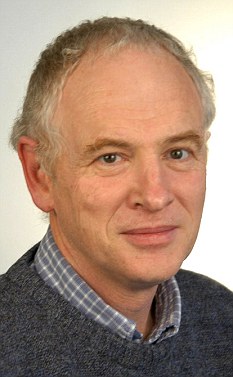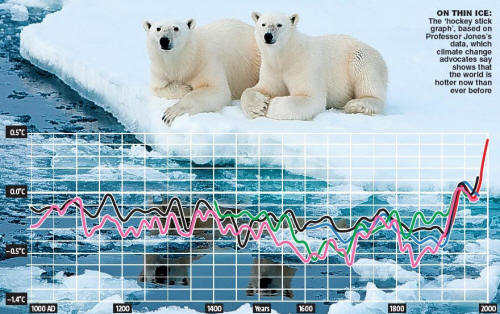|

by Jonathan Petre
February 14, 2010
from
DailyMail Website
-
Data for vital 'hockey
stick graph' has gone missing
-
There has been no global warming
since 1995
-
Warming periods have happened
before - but NOT due to man-made changes

Data: Professor Phil
Jones
admitted his record keeping
is 'not as good as it should be'
The academic at the centre of the
'Climategate' affair, whose raw data is crucial to the theory of
climate change, has admitted that he has trouble 'keeping track' of
the information.
Colleagues say that the reason Professor Phil Jones has
refused Freedom of Information requests is that he may have
actually lost the relevant papers.
Professor Jones told the BBC yesterday there was truth in the
observations of colleagues that he lacked organizational skills,
that his office was swamped with piles of paper and that his record
keeping is 'not as good as it should be'.
The data is crucial to the famous 'hockey stick graph' used by
climate change advocates to support the theory.
Professor Jones also conceded the possibility that the world was
warmer in medieval times than now – suggesting global warming may
not be a man-made phenomenon.
And he said that for the past 15 years there has been no
'statistically significant' warming.
The admissions will be seized on by skeptics as fresh evidence that
there are serious flaws at the heart of the science of climate
change and the orthodoxy that recent rises in temperature are
largely man-made.
Professor Jones has been in the spotlight since he stepped down as
director of the University of East Anglia's Climatic Research Unit
after the leaking of emails that skeptics claim show scientists were
manipulating data.
The raw data, collected from hundreds of weather stations around the
world and analyzed by his unit, has been used for years to bolster
efforts by the United Nation's Intergovernmental Panel on Climate
Change to press governments to cut carbon dioxide emissions.
Following the leak of the emails, Professor Jones has been accused
of 'scientific fraud' for allegedly deliberately suppressing
information and refusing to share vital data with critics.
Discussing the interview, the BBC's environmental analyst Roger
Harrabin said he had spoken to colleagues of Professor Jones who
had told him that his strengths included integrity and doggedness
but not record-keeping and office tidying.
Mr Harrabin, who conducted the interview for the BBC's website, said
the professor had been collating tens of thousands of pieces of data
from around the world to produce a coherent record of temperature
change.
That material has been used to produce the 'hockey stick graph'
which is relatively flat for centuries before rising steeply in
recent decades.
According to Mr Harrabin, colleagues of Professor Jones said,
'his office is piled high with
paper, fragments from over the years, tens of thousands of
pieces of paper, and they suspect what happened was he took in
the raw data to a central database and then let the pieces of
paper go because he never realized that 20 years later he would
be held to account over them'.
Asked by Mr Harrabin about these issues,
Professor Jones admitted the lack of organization in the system had
contributed to his reluctance to share data with critics, which he
regretted.

But he denied he had cheated over the
data or unfairly influenced the scientific process, and said he
still believed recent temperature rises were predominantly man-made.
Asked about whether he lost track of data, Professor Jones said:
'There is some truth in that. We do
have a trail of where the weather stations have come from but
it's probably not as good as it should be.
'There's a continual
updating of the dataset. Keeping track of everything is
difficult. Some countries will do lots of checking on their data
then issue improved data, so it can be very difficult. We have
improved but we have to improve more.'
He also agreed that there had been two
periods which experienced similar warming, from 1910 to 1940 and
from 1975 to 1998, but said these could be explained by natural
phenomena whereas more recent warming could not.
He further admitted that in the last 15 years there had been no
'statistically significant' warming, although he argued this was a
blip rather than the long-term trend.
And he said that the debate over whether the world could have been
even warmer than now during the medieval period, when there is
evidence of high temperatures in northern countries, was far from
settled.
Skeptics believe there is strong evidence that the world was warmer
between about 800 and 1300 AD than now because of evidence of high
temperatures in northern countries. But climate change advocates
have dismissed this as false or only applying to the northern part
of the world.
Professor Jones departed from
this consensus when he said:
'There is much debate over whether
the
Medieval Warm Period was global
in extent or not. The MWP is most clearly expressed in parts of
North America, the North Atlantic and Europe and parts of Asia.
'For it to be global in extent, the MWP would need to be seen clearly in more records from the
tropical regions and the Southern hemisphere. There are very few
paleoclimatic records for these latter two regions.
'Of course, if the MWP was shown to be global in extent and as
warm or warmer than today, then obviously the late 20th Century
warmth would not be unprecedented. On the other hand, if the MWP
was global, but was less warm than today, then the current
warmth would be unprecedented.'
Skeptics said this was the first time a
senior scientist working with the IPCC had admitted to the
possibility that the Medieval Warming Period could have been
global, and therefore the world could have been hotter then than
now.
Professor Jones criticized those who complained he had not shared
his data with them, saying they could always collate their own from
publicly available material in the US. And he said the climate had
not cooled 'until recently – and then barely at all. The trend is a
warming trend'.
Mr Harrabin told Radio 4's Today program that, despite the
controversies, there still appeared to be no fundamental flaws in
the majority scientific view that climate change was largely
man-made.
But Dr Benny Pieser, director of the skeptical
Global Warming Policy Foundation,
said Professor Jones's 'excuses' for his failure to share data were
hollow as he had shared it with colleagues and 'mates'.
He said that until all the data was released, skeptics could not
test it to see if it supported the conclusions claimed by climate
change advocates.
He added that the professor's concessions over medieval warming were
'significant' because they were his first public admission that the
science was not settled.
MAIL ON SUNDAY COMMENT
The Professor's Amazing Climate
Change Retreat
February 13, 2010
from
DailyMail Website
Untold billions of pounds have been spent on turning the world green
and also on financing the dubious trade in carbon credits.
Countless gallons of aviation fuel have been consumed carrying
experts, lobbyists and politicians to apocalyptic conferences on
global warming.
Every government on Earth has changed its policy, hundreds of
academic institutions, entire school curricula and the priorities of
broadcasters and newspapers all over the world have been altered –
all to serve the new doctrine that man is overheating the
planet and must undertake heroic and costly changes to save the
world from drowning as the icecaps melt.
You might have thought that all this was based upon well-founded,
highly competent research and that those involved had good reason
for their blazing, hot-eyed certainty and their fierce intolerance
of dissent.
But, thanks to the row over
leaked emails from the
Climatic Research Unit, we now
learn that this body's director, Phil Jones, works in a
disorganized fashion amid chaos and mess.
Interviewed by the highly sympathetic BBC, which still insists on
describing the leaked emails as 'stolen', Professor Jones has
conceded that he 'did not do a thorough job' of keeping track of his
own records.
His colleagues recall that his office was 'often surrounded by
jumbled piles of papers'.
Even more strikingly, he also sounds much less ebullient about the
basic theory, admitting that there is little difference between
global warming rates in the Nineties and in two previous periods
since 1860 and accepting that from 1995 to now there has been
no statistically significant warming.
He also leaves open the possibility, long resisted by climate change
activists, that the 'Medieval
Warm Period' from 800 to 1300 AD, and thought by many
experts to be warmer than the present period, could have encompassed
the entire globe.
This is an amazing retreat, since if it was both global and
warmer, the green movement's argument that our current position is
'unprecedented' would collapse. It is quite reasonable to suggest
that human activity may have had some effect on climate. There is no
doubt that careless and greedy exploitation has done much damage to
the planet.
But in the light of the 'Climategate' revelations, it is time for
governments, academics and their media cheerleaders to be more
modest in their claims and to treat skeptics with far more courtesy.
The question is not settled.
'Super-taxes' always fail
The Treasury appears to have waved goodbye to large sums of money it
could have collected in tax from the super-rich, thanks to a poorly
designed attempt to help the film industry.
Compare and contrast this laxity with the inescapable tax burden
on ordinary people whose income is taxed at source and who are
pursued with severity for every penny.
This sort of inequality is the direct result of ever more 'creative'
attempts to use the tax system for social engineering.
As HM Revenue and Customs will find when the new 50 pence tax
rate is imposed in April, higher rates stimulate the rich into ever
more ingenious efforts to avoid paying up.
Taxes should be simple, low and fair.
Then everyone will pay them.
|



